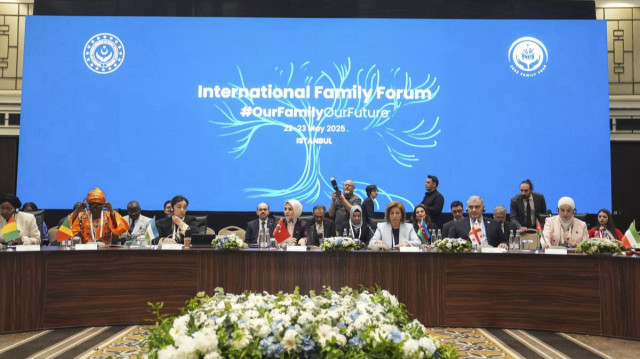
2-day event organized under auspices of Türkiye's Family and Social Services Ministry, with Anadolu serving as global communications partner
The first day of the International Family Forum in Istanbul concluded Thursday with a panel titled “Between Fiction and Reality: Family in Culture, Art and Media.”
It was part of a two-day event organized under the auspices of Türkiye's Family and Social Services Ministry as part of the country's 2025 Year of the Family initiative.
Anadolu is serving as the event's global communications partner.
Anadolu's Deputy Director General and Editor-in-Chief Yusuf Ozhan, who moderated the panel, emphasized how the concept of family is represented in today's world through art, media and culture.
Ozhan said they examined the interaction between these representations, social platforms, public perception and real life.
During the panel, he said they discussed how art and media could be used to strengthen family values and offer solutions to family-related issues.
Tatjana Macura, minister without portfolio in charge of gender equality, prevention of violence against women and economic and political empowerment of women, said that when discussing the family in the space between fiction and reality, it cannot ignore the fact that fiction—whether in films, series, advertisements, or social media—often shapes people's perception of family relationships more than real life itself.
Macura warned that modern media often portrays distorted family roles, especially placing disproportionate burdens on women while sidelining men.
She emphasized that these glamorized yet unrealistic portrayals—common in TV shows and social media—undermine real-life family dynamics and contribute to emotional imbalance in households.
Macura called for cultural content that promotes mutual responsibility and realistic models of shared family life.
She also stressed the influence of the digital space.
“Today, the online world is largely unregulated, shaped by the interests of private companies rather than the well-being of children. Parents must stay aware of what their children are exposed to -- not only out of concern, but out of responsibility.”
“Let the message from this panel be clear. Culture and media are not natural observers of family life. They are its architects. And we, as decisionmakers and policymakers, have the task to define together what kind of family lives not only in reality, but also in the imagination of millions, because today's imagination shapes tomorrow's reality,” she added.
Omer Dahab F. Mohamed, Ambassador-at-Large of US-based Family Watch International, emphasized that protecting the family unit is vital for preserving cultural continuity.
Thanking the participants, Mohamed added that the preservation of family and cultural values is essential for global peace and social solidarity.
Indonesia's Deputy Minister of Population and Family Development, Ukik Kusuma Kurniawan, said the arts and media play a critical role in shaping the family structure.
He detailed Indonesia's Golden Indonesia 2045 Vision, which includes strategies to prevent child marriage, improve child health and support elderly care.
He also noted that new values brought by globalization are challenging the family structure, emphasizing the important role that religious and social leaders play in preserving family norms.
Ipek Coskun Armagan, general coordinator of Institute Social, presented the Children's Rights Convention in the Digital World, developed to address children's rights in online environments.
Armagan said they found that the UN Convention on the Rights of the Child does not include any reference to the digital world.
Noting that the 13-article convention fills that gap and is now available in multiple languages, she invited attendees to sign it via a QR code projected during the session.
She also reflected on Türkiye's demographic challenges, linking today's fertility issues to decades of population planning.
Armagan also warned that digital tools and artificial intelligence are altering family dynamics by shifting responsibilities to machines and platforms, creating new challenges.
Kubra Bayraktar, General Manager of the Content for Children Association, said her organization works to improve digital literacy for children by analyzing media with clinical psychologists.
They hear from many families about the negative effects of harmful online content, she noted.
“No one can be a perfect parent, and we don't claim to be,” she said. “But we must be present and proactive to guide our children.”
Uner Karabiyik, chairman of the board of the Istanbul Family Foundation, criticized the influence of Turkish TV dramas abroad.
Karabiyik cited a recent study conducted by his foundation with 1,600 women which found that daytime TV programs decrease marital satisfaction and reduce emotional intimacy between spouses.
“These shows lead to authoritarian attitudes, increased social media use, and lower psychological and spiritual well-being,” he said.
The forum will continue Friday with panels titled “Being a Family in the Age of Screens” and “The Myth of Overpopulation: How a global agenda contributed to the decline of populations.”
The closing session is expected to include remarks by Turkish President Recep Tayyip Erdogan.
The forum aims to bring together high-level officials, experts and other stakeholders to protect and strengthen the institution of family and marriage and to preserve generations and a strong population structure.
It aims to contribute to a better understanding of the challenges and opportunities facing families and communities and to provide a common platform to discuss ways to protect and strengthen the family institution and better support families in fulfilling their critical role in our societies.
The event also aims to put forward a concrete initiative to establish a common position on the protection of the family institution and its values on international platforms.







